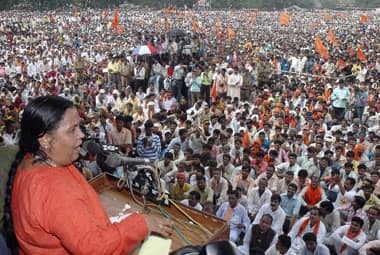BJP leader Uma Bharti has responded to the proposal to permit FDI in multi-brand retail stores with her characteristic subtlety of expression. She will, she says , personally set fire to any Wal-Mart store that may set up shop anywhere in India.
Her party says it opposes multinational retail giants because they will suck up the business of small, neighbourhood stores and create unemployment.
At the other end of the political spectrum, the Left parties too have opposed the FDI in retail on ideological grounds.
Wal-Mart is of course a lightning rod for criticism and ideological bashing in many parts of the world, not least in the country of its origin, the US. Much of this criticism relates to its business and labour practices and wage policy, and on at least a few counts, the criticism is justified.
[caption id=“attachment_140634” align=“alignleft” width=“380” caption=“Uma Bharti, president of India’s Bharatiya Janashakti Party (BJSP), addresses a public rally . Reuters”]
 [/caption]
[/caption]
But in equal measure, some of the grounds on which Indian political leaders criticise Wal-Mart don’t apply in an Indian context - or if they do, the criticism is entirely without merit, and serves only to keep the parties’ own gravy trains running.
For instance, the BJP’s criticism that the Wal-Marts of the world will suck up the business of kirana stores is, as Firstpost has argued , an exaggerated fear. It brings to mind the campaign against KFC in the late 1990s bythe anti-globalisation leader from Karnataka, MD Nanjundaswamy, which too fed on the swadeshi sentiment momentarily, but has since been proved wrong. The advent of multinational fast-food joints hasn’t exactly wiped out the famed Udupi restaurants, as had been feared.
In fact, a 2008 study by Russell Sobel and Andrea Dean at West Virginia University established that contrary to popular belief, Wal-Mart had not caused any significant harm to the traditional, small “mom and pop” business sector. Even if, as happened in some cases, the entry of a speci?c Wal-Mart store caused some individual, smallmom-and-pop businesses to fail, these failures, the researchers concluded, were completely offset by the entry of other new small businesses elsewhere in the economy.
On this count, the BJP’s opposition appears only calculated to protect its own constituency of traders.
Likewise, the advent of multi-brand retail outlets will, if anything, open up jobs in the service sector and help facilitate a cold-storage chain that will benefit the farm sector.
Similarly, the Left parties’ opposition to the entry of the Wal-Marts of the world springs principally from the fact that Wal-Mart has a policy of not permitting labour unions. (That policy has, of course, been violated in China, where workers are unionised under the official - and far from independent - labour union, as one of the conditions for Wal-Mart to operate in that country.)
But the Left has already lost that battle over unions in the IT sector in India, which perhaps accounts for the sector’s good showing.
While labour unions may have served a social purpose in an earlier time when workplaces were a lot more exploitative, given today’s labour dynamics - where skills are in enormous shortage and skilled workers can vote with their feet - the demand for unionisation is in a bear market. Having missed its gravy train, the Left is clutching at straws on this one.
It’s one thing to argue in favour of protecting one’s interests when one permits the Wal-Marts of the world to come in. But the grounds on which the BJP and the Left have opposed the proposal in its entirety - and in the BJP’s case, invoking incendiary language - is blatantly self-serving.
Their language of demonisation of the Wal-Marts of the world is an anachronism that has long outlived its political utility.
Venky Vembu attained his first Fifteen Minutes of Fame in 1984, on the threshold of his career, when paparazzi pictures of him with Maneka Gandhi were splashed in the world media under the mischievous tag ‘International Affairs’. But that’s a story he’s saving up for his memoirs… Over 25 years, Venky worked in The Indian Express, Frontline newsmagazine, Outlook Money and DNA, before joining FirstPost ahead of its launch. Additionally, he has been published, at various times, in, among other publications, The Times of India, Hindustan Times, Outlook, and Outlook Traveller.
)